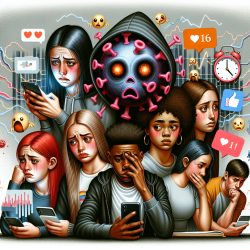Understanding the Impact of Social Media on COVID-19-Related Anxiety in Youth
As a Special Education Director, staying informed about the latest research and trends in youth mental health is crucial. A recent study titled "COVID-19-related anxiety and the role of social media among Canadian youth" sheds light on a pressing issue: the relationship between social media usage and anxiety levels in young people during the pandemic.
The Research Findings
Conducted by Kim et al. (2023), the study explored the impact of different types of screen time on COVID-19-related anxiety among youth in Southern Ontario, Canada. The research spanned five time points from early 2021 to spring 2022, focusing on passive watching, social media, video games, and educational screen time.
The findings were eye-opening. During late spring 2021, when safety restrictions were most stringent, screen time and anxiety levels peaked. Notably, spending 1-5 hours daily on social media was significantly associated with increased anxiety, even when accounting for other screen time types and demographic factors.
Implications for Practitioners
As practitioners, understanding these dynamics can enhance our ability to support youth effectively. Here are some strategies to consider:
- Promote Healthy Screen Time: Encourage adherence to the Canadian 24-Hour Movement Guidelines, which recommend no more than 2 hours of recreational screen time daily.
- Model Healthy Behavior: Parents and caregivers should model healthy screen habits, limiting their own social media use.
- Provide Guidance: Offer educational resources and campaigns to help families manage screen time effectively.
- Policy Advocacy: Advocate for policies that prioritize safe in-person schooling and extracurricular activities to reduce reliance on social media for social interaction.
- Training and Resources: Equip youth with tools to navigate social media safely and reflect on its impact on their mental health.
Encouraging Further Research
While this study provides valuable insights, it also highlights the need for further research. Larger, longitudinal studies could deepen our understanding of the relationship between screen time and anxiety, considering factors like socioeconomic status and educational background.
By staying informed and proactive, we can better support the mental health of our youth during these challenging times. To read the original research paper, please follow this link: COVID-19-related anxiety and the role of social media among Canadian youth.










